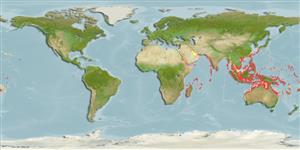>
Eupercaria/misc (Various families in series Eupercaria) >
Caesionidae (Fusiliers) > Caesioninae
Etymology: Caesio: Latin, caesius, bluish-grey, 1835; it is the same name given to the silvery metal (Cs) (Ref. 45335).
More on author: Lacepède.
Environment: milieu / climate zone / depth range / distribution range
بوم شناسي
دريايي وابسته به آب سنگ; غير مهاجر; تغييرات عمق 1 - 60 m (Ref. 30874). Tropical; 34°N - 31°S, 30°E - 116°W (Ref. 94071)
Indo-West Pacific: Red Sea and East Africa to Samoa, north to southern Japan, south to New Caledonia. Absent in the Arabian (Persian) Gulf.
Size / Weight / سن
Maturity: Lm ? range ? - ? cm
Max length : 45.4 cm FL جنس نر / بدون خواص جنسي; (Ref. 125599); common length : 25.0 cm TL جنس نر / بدون خواص جنسي; (Ref. 39189); بيشينه وزن گزارش شده: 1.6 kg (Ref. 125599)
خارهاي باله پشتي (کل): 10; شعاع نرم باله پشتي (کل): 14-16; خارهاي باله مخرجي 3; شعاع نرم باله مخرجي: 10 - 12. This species is distinguished by the following characters: postmaxillary process single; A III,12 (rarely 13); lateral line scales 57-65 (usually around 61); scale rows on spinous part of dorsal fin horizontal; supratemporal bands of scales often interrupted at dorsal midline by a scaleless zone, always a V-shaped scaleless zone anteriorly at midline intruding between the supratemporal band of scales; body colour with upper body bluish and the lower white to pale bluish; a single yellow or golden stripe directly above lateral line except on caudal peduncle where it is about 1 scale above lateral line, the yellow stripe 2 or 3 scales wide, bordered directly above and below by a white or light blue stripe which is about 1 scale wide, caudal-fin lobes with a black median streak (Ref. 68703).
Adults are found in schools in deep lagoons and along seaward reefs in coastal areas (Ref. 9710), mixing with other species of fusiliers (Ref. 48636). Juveniles are used as tuna bait fish. They are oviparous, with small pelagic eggs (Ref. 402). Maximum depth reported taken from Ref. 128797.
Life cycle and mating behavior
بلوغ | تولید مثل | تخم ریزی | تخم ها | Fecundity | توزاد ( لارو)
Mating behavior is marked by six distinguishable patterns, namely: 1) nuzzling; 2) several males joining in courtship; 3) spiraling towards the surface; 4) pair spawning; 5) sperm release by sneakers; and 6) post spawning.
Nuzzling is done about 1-1.5 hours before spawning. For most of the day the fish swam slowly in school. At nearly spawning time, one or two males approach a selected female and begin pecking and pushing her swollen abdomen with their snouts. Interruption happens at this stage resulting in spawners returning to the school. With less than an hour until spawning, 2-6 males may attempt to get their abdomen as close to the female's abdomen as possible. For the pair that completes this position, a spiraling ascent to the surface occurs followed by a release of both eggs and sperm while other males come in pursuit. These sneakers release sperm at the same spot where the initial pair had released their gametes. Some spawnings may occur without sneakers getting involved in the process (Ref. 37498).
Carpenter, K.E., 1987. Revision of the Indo-Pacific fish family Caesionidae (Lutjanoidea), with descriptions of five new species. Indo-Pac. Fish. (15):56 p. (Ref. 1723)
وضعيت در فهرست قرمز IUCN (Ref. 130435)
خطر برای انسان ها
Harmless
استفاده انسانی
ماهي گيري – شيلات: تجاري; طعمه: occasionally
اطلاعات بيشتر
مراجعآبزي پرورينمايه آبزي پرورينژادهاژنتيكElectrophoresesوارثبيماري هافرآوریNutrientsMass conversion
ابزارها
گزارش های ويژه
بارگيری XML
منابع اينترنتي
Estimates based on models
Preferred temperature (Ref.
123201): 24.7 - 29, mean 28 °C (based on 814 cells).
Phylogenetic diversity index (Ref.
82804): PD
50 = 0.5020 [Uniqueness, from 0.5 = low to 2.0 = high].
Bayesian length-weight: a=0.01349 (0.00821 - 0.02216), b=3.06 (2.92 - 3.20), in cm total length, based on LWR estimates for this species & (Sub)family-body (Ref.
93245).
Trophic level (Ref.
69278): 3.4 ±0.45 se; based on food items.
جهندگی (Ref.
120179): متوسط, كمينه زمان لازم براي دو برابر شدن جمعيت 4/1 – 4/4 سال (Preliminary K or Fecundity.).
Fishing Vulnerability (Ref.
59153): Moderate vulnerability (40 of 100).
Nutrients (Ref.
124155): Calcium = 58.9 [38.9, 86.2] mg/100g; Iron = 0.742 [0.489, 1.080] mg/100g; Protein = 19 [18, 20] %; Omega3 = 0.141 [0.098, 0.203] g/100g; Selenium = 32.6 [20.7, 55.2] μg/100g; VitaminA = 102 [42, 251] μg/100g; Zinc = 1.14 [0.83, 1.52] mg/100g (wet weight);
